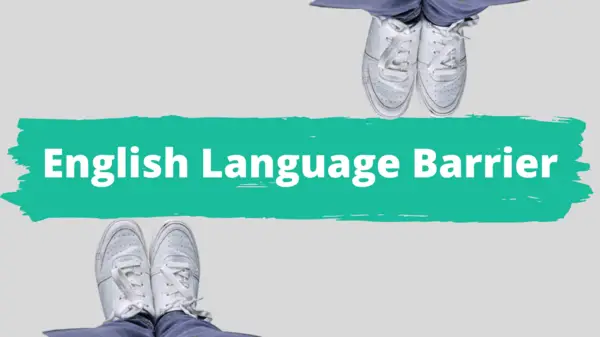Last updated on December 21st, 2024 at 03:06 pm
Learning a new language is not always an easy accomplishment. Polyglots have mastered this skill; however, it requires a lot of courage, determination, and countless hours of practice for the majority of us.
English is not an exception to this rule. Regardless of one’s motivation for learning English, every student faces challenges, and one of these challenges is the language barrier.
A language barrier appears when two people who speak different languages try to communicate. There is an invisible barrier that separates these two people. It stops them from engaging with each other and sharing their true thoughts and feelings simply because they cannot express themselves effectively.
Many language learners feel frustrated when they communicate in a foreign language because their language knowledge limits them. They may express their thoughts on different topics effectively in their home language but cannot achieve the same goals in a foreign language.
What Are The Language Barriers?
Quick Navigation
Language barriers are the root causes of many problems or obstacles in health care, aviation, maritime, business, and education.
Language barriers are apparent when two people don’t speak the same language, but this is not the only place they exist. They can appear even when two people speak the same language.
Technical jargon and specific technical language used in specialized fields can leave people very confused on the outskirts of those fields. This is another form of a language barrier. Some people communicate using terminology that other people, who speak the same language, can’t understand. This leaves room for a lot to get lost in translation and for miscommunication to occur.
Regional slang is another dividing factor. The language used by people in the same country can change drastically from region to region because the slang that has developed in those areas over time is only spoken in that region. Furthermore, once the language develops into something identifiably unique, it becomes an entirely different dialect. It is no surprise that miscommunication happens in countries where one language is spoken, but many dialects exist.
Finally, we must not devalue body language and its ability to help us communicate. We can say a lot with our bodies, and we can shake our heads to say ‘no’ and nod our heads to say ‘yes.’ But we can run into communication issues when those same body movements have a different meaning in another country or culture. In the worst-case scenario, we could insult someone by using a gesture that is not offensive in our own culture.
There are many aspects to language barriers, and they exist everywhere, which makes communication difficult, even for people who speak the same language.
Barriers For English Language Learners
Language barriers form when English learners try to say too much too quickly. It’s easy to get ahead of ourselves, especially when we struggle to find the words to express ourselves clearly. The first step to being understood is to slow down, take a deep breath, and think about what you want to say.
English learners’ most common language barriers are caused by not knowing the correct words, overcomplicating communication, and speaking too quickly to be understood.
English language learners often overcomplicate their speech with inappropriate vocabulary when a simple word can take its place. This happens when the direct translation from someone’s mother tongue translates into an English word that native speakers or other second-language English speakers do not commonly use.
Communication becomes complicated when English language learners try to throw everything they know into a sentence and speak in the wrong tense or grammatical structure. This leaves a lot more work for the listener, and the listener needs to decipher what you’re trying to say. In the end, the communication relies on the broken pieces being strung together, which often ends in miscommunication.
It’s also important to remember that there is a rhythm to English. Native English speakers only stress the most critical words in a sentence and shift sentence stress to emphasize a point. If you speak English with the wrong rhythm, the listener could understand everything you are saying, but they can still misunderstand the meaning.
Remember that native English speakers can also speak too fast, and there is no shame in asking them to slow down or repeat a word or sentence. Language barriers also form because English language learners struggle to comprehend spoken language quickly. Improving your listening skills is a great way to combat this, but remember that you can ask people to slow down and repeat themselves.
Causes of Language Barriers
Language barriers are caused by not being able to produce language and not being able to understand language. There are two people involved in communication, and the person who is speaking needs to speak loudly and clearly to ensure that nothing is missed.
They need to speak directly to the point they are making without beating around the bush. The listener needs to interpret and understand what the speaker is saying actively. Both of these tasks need to be successful for communication to be successful.
Many aspects can get in the way of our understanding, even if we hear someone speaking loudly, clearly, and with good rhythm and intonation.
The Difference in Native Language
One language can have many different dialects. A dialect forms when two separate regions speak the same language but develop their own ways of using it. The dialects are not different enough to be considered a different language, but they are different enough to form a misunderstanding or a lot of confusion.
Take, for example, American and British English. Americans call trousers’ pants.’ British people call underwear ‘pants’ and trousers’ trousers.’ This creates humorous confusion between Americans and British people even though they speak the same language. If you ask a British person if your pants look good, they will be very taken aback and confused by your question.
There are countless more examples of English words like these, and that’s only between two separate countries. There are many dialects in America and the UK and plenty more in other English-speaking countries.
People Have Different Accents
Accents are particularly confusing. You can be fluent in English and still be thrown off by an accent. A thick Scottish or Irish accent, for example, is almost incomprehensible to someone who is not from the UK. Don’t panic if you don’t understand every English accent; very few people do. It’s a great idea to expose yourself to many different accents while you’re learning a new language and, slowly, you will start to understand.
Accents can cause gaps in communication that the listener needs to fill in. Any time the listener needs to fill in the gaps and do guesswork, you are at risk of forming a language barrier.
Use of Slang
Slang is particularly difficult to understand. These are words used in specific informal situations and might not always have a clear meaning or use. It’s fun to learn and use slang, so have fun with it if you need to learn the slang of a specific country or region.
Slang creates language barriers because there is no opportunity to translate the word from English to your mother tongue, and the meaning will be entirely lost in translation.
Different Spelling of Words
Simply not understanding the spelling of a word in writing can confuse you when chatting online or via text messages. This is an instant language barrier because communication has been halted. The reader will not understand the written word, and communication will have failed.
Barriers to Speaking the English Language
Language barriers usually happen when a person struggles to construct the correct sentence with the right words in their mind and then get it out of their mouth. English learners often know a lot of grammar rules and vocabulary, but they tend to struggle to speak fluently.
English language barriers when speaking include talking around and around in circles while trying to formulate the correct sentence or finding the right word; feeling nervous and stressed out only worsens. The listener needs to be actively involved in the conversation, and the speaker needs to guide them to understand what they are saying. If you lose the interest of the listener, you lose the potential to communicate,
On the other hand, it isn’t a good idea not to say anything either. Nothing creates a language barrier faster than not saying anything or producing a few short words in a very broken sentence.
Even once you have mastered the art of finding the correct words and putting them into the correct tenses to communicate effectively, you need to learn how to speak English with a good rhythm and intonation. These are the finishing touches that ensure you get your meaning across clearly and without ambiguity.
How to Overcome English Language Speaking Barriers
There is only one way to improve your English language speaking skills to overcome the English language speaking barriers – and that’s to speak English. It sounds simple, but finding an English-speaking partner can be a challenge. The most important thing is to find a native speaker who can guide you on your journey to overcoming English language barriers.
A native English speaker will also help you understand the nuances of the different English dialects. Speak English every day to put your theoretical knowledge into practice. This will expand your knowledge and understanding of the English language and give you the confidence to use the English language outside of a classroom environment.

Azizul Hakim is the founder & CEO of englishfinders.com. He is a passionate writer, English instructor, and content creator. He has completed his graduation and post-graduation in English language and literature.




